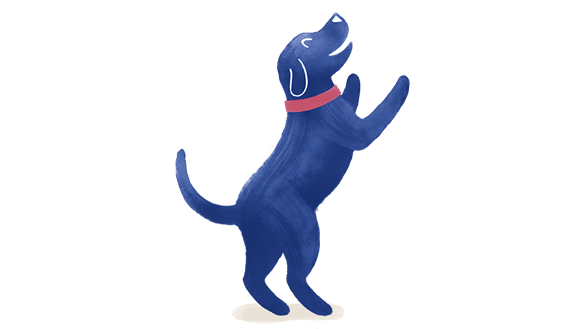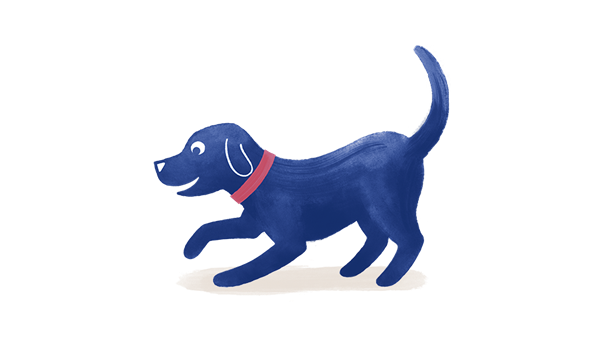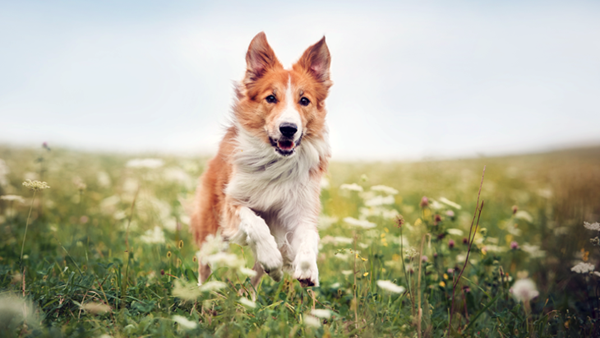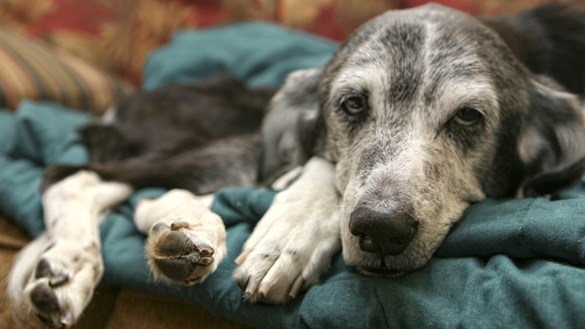Dog Poisoning: Signs and Symptoms
Poisoning is very serious and can be fatal if left untreated. The average household is littered with hidden dangers. Keeping these well out of paw’s reach is vital to protecting your dog.

Dogs are naturally inquisitive, always sniffing out and tasting new things. Unfortunately, this puts them at risk of encountering poisons and toxins which, if eaten, licked or brushed up against, can make them very unwell.
Read more for the hidden dangers.
Household cleaners
Dogs may be tempted to play with and chew brightly coloured and interestingly shaped bottles, mistaking them for toys. The astringent smell will put them off actually drinking the contents, but if they walk on recently cleaned surfaces or through spillages their paws will pick up residues which they may lick later.
Common toxic household cleaners:
- Bleach can cause stomach issues and corrosion around the mouth and in the gut if drunk. It can also cause further issues if splashed in the eye or on the skin
- Laundry detergent, soaps and multipurpose cleaners can cause vomiting, which may appear foamy or frothy, as well as stomach upset and dehydration
- Dishwasher tablets can look like treats to dogs, but cause vomiting, diarrhoea and burns around the mouth and in the stomach
- Dishwasher salt causes extreme thirst and urination, vomiting, and decreased appetite
- Oven and drain cleaners are highly caustic and can cause internal tissue damage and chemical burns around the mouth
Human medications
Never give dogs human medications, which are very different from dog medicines, with potentially fatal ingredients and dosages. Always keep medicine packets locked away to keep your dog safe.
Particularly dangerous medications:
- Ibuprofen and other anti-inflammatories can make dogs very unwell by affecting their body’s ability to protect the gut, leading to ulcers, bloody stools and kidney failure
- Paracetamol causes vomiting, raised heart rate, breathing difficulties and swelling around the face and paws. It can also cause delayed liver failure
- Psoriasis cream contains vitamin D which causes weakness, vomiting and diarrhoea, leading to muscle spasms, heart problems and kidney failure
Gardening products
There are lots of toxins in the garden, shed and garage. These can be hazardous to your dog if swallowed, so always make sure you secure the lids of gardening products and store them above ground level.
Common garden poisons:
- Slug killer contains toxic metaldehyde, which causes tremors, fits and twitching that can go on for several days
- Fertiliser can contain additives that are toxic to dogs, causing vomiting, diarrhoea and collapse if eaten in large quantities. Safer pet-friendly fertiliser is available, but always store it out of reach of your dog
- Rat poison affects the body’s ability to clot blood, resulting in excessive bleeding. Symptoms include weakness, lameness, bruising and vomiting
- Weed killer varies dramatically, but can cause dehydration, bloody vomiting, breathing and heart issues, mouth ulcers and kidney and liver failure
Plants and fungi
There are many plants and fungi that are toxic to dogs if eaten or brushed up against. Avoid planting any toxic blooms in your garden and always keep an eye out for dangerous plants when you’re out walking your dog.
Common toxins in nature:
- Mushrooms and fungi vary throughout the UK and it’s notoriously difficult to identify whether they’re safe or poisonous. Symptoms depend on the type and amount eaten, but may include vomiting, diarrhoea, neurological effects (hallucinations and fitting) and liver or kidney damage. These can appear immediately or several days, even weeks, afterwards
- Spring bulbs (e.g. daffodils, tulips, bluebells) can cause stomach upset, fits, irritation around the mouth and disorientation
- Conkers can block airways and contain the chemical aesculin which may cause internal damage
- Acorns contain tannic acid which causes stomach upset, diarrhoea and even kidney disease
- Mouldy or rotten foods can also contain toxic fungi that will make pets very unwell - always contact your vet if you know your dog has eaten the contents of a food waste bin or similar
Foods
It’s well known that certain foods are off-limits to dogs. Unfortunately, a hungry dog won’t necessarily know what’s good for them, so keep these toxins out of reach and always supervise your dog around food.
Common toxic foods:
- Chocolate is famously bad for dogs. It contains theobromine, which can cause vomiting, diarrhoea, seizures, internal bleeding and even heart attacks
- Alliums (onions, garlic, shallots and chives) can damage red blood cells, causing serious anaemia. Symptoms may not present themselves for several days but can include vomiting, diarrhoea and tiredness, as well as discoloured urine
- Raisins, grapes, sultanas and currants can lead to stomach problems and kidney failure, with symptoms not presenting themselves for three days
- Xylitol, which is in some sugar-free sweets, gums and medicines, can cause dangerously low blood sugar levels and liver failure. Symptoms include weakness, lethargy and collapse
- Blue cheese contains a fungus that produces a toxic substance called roquefortine C. It can cause vomiting, diarrhoea and seizures if eaten
What to do if your dog is poisoned
If your dog shows any symptoms of poisoning, or if they’ve eaten something they shouldn’t, take them to your nearest vet immediately. If possible, take the source of the poison with you to give your vet a clearer picture of the problem. In the case of fungus or mushroom poisoning, note where you found it and take a sample in a plastic bag (a poo bag comes in handy) to help identify it.
Stay calm and never make your dog sick as this can cause further issues that can harm them.
Dog anti-poisoning treatments
Treatments vary depending on the type of poison and the amount eaten. An antidote can usually only be given if your vet knows the source of the poison. If the toxin is unknown, your vet will treat your pet’s symptoms to maintain the normal function of their organs until the poison has passed through their body.
Unfortunately, some poisoning cases can’t be treated and may be fatal, particularly if a large amount of toxin has been swallowed.
For more information about protecting your dog from toxins around the home, speak to your Medivet practice.

Our Healthcare Plans For Your Dog
With the Medivet Healthcare Plan, you can save up to £280 each year and that’s without discounts that the plan offers on top.
Learn more

Our Pet Care Advice
At Medivet, we’re committed to providing trustworthy, expert advice that helps you care for your pet. Don't miss our latest advice for keeping your pets happy and healthy.
Search advice





